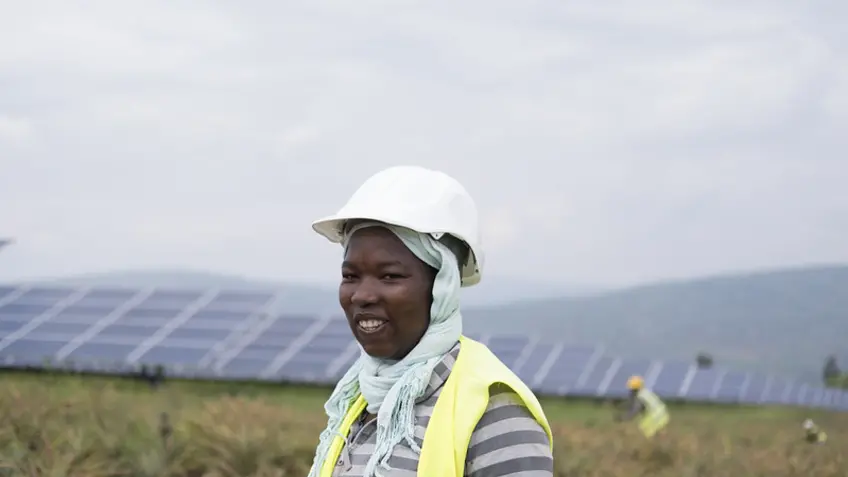Rwanda Renews Climate Optimism: Africa’s First Revised NDC Shows Global Leadership
Rwanda became the first African country to submit its updated national climate plan under the Paris Agreement this month. The ambitious submission renews hope that 2020 can be “the Super Year for Climate Action.”
Rwanda’s submission ignites optimism for climate action because of the speed, scale and time of its bold commitments. Despite its relatively small climate footprint, and the unprecedented logistical, economic, and health challenges caused by the COVID-19 pandemic, Rwanda intends to cut emissions by 38% by 2030. The US$11 billion commitment is nearly a tenth more than the total value of Rwanda’s annual domestic economic output.
Africa’s first updated Nationally Determined Commitment (NDC) promises to:
-
Reduce greenhouse gas emissions by 38% through unconditional (16%) and conditional (22%) measures, and nearly equal spending on mitigation (US$5.7B) and adaptation (US$5.4B);
-
Track adaptation in and across vulnerable sectors using 38 indicators. The sectors are water, agriculture, land and forestry, human settlement, health, transport, and mining.
-
Pursue emissions reduction across key sectors in order of rank and priority: agriculture, energy, waste, and industrial processes and product use.
Rwanda’s ambitious submission is a product of longstanding Government ownership and broad national engagement. Rwanda leveraged inter-ministerial and international cooperation to develop and link ambitious climate and development goals. Rwanda’s collaborative approach enabled it to set an exemplary pace for implementation, mobilize and share capacities, resources and knowledge from multiple angles. Rwandan officials designed and validated a Partnership Plan (2018) to guide its mobilization of resources, tap insights and strengths across the society to revise its national climate plan. This “whole-of-government” and “whole-society” approach to climate action utilized support from the World Bank to expand existing policies, including a Green Growth and Climate Resilience Strategy and sectoral implementation priorities, to set ambitious goals grounded in rigorous data analysis. Informed by analysis on quantified mitigation and adaptation targets, and aligned with national development policy objectives, Rwanda’s NDC is poised to simultaneously reduce emissions, enable climate resilience and boost economic growth. Rwanda’s prioritization of climate action in the agricultural sector, which accounts for a third of domestic economic activity, typifies its comprehensive “win-win” NDC strategy. The potential of this decisive plan is magnified by near maximal household subsistence on traditional agriculture (90%), especially in rural areas where over three-quarters of the population is concentrated.
“Rwanda is pleased to submit its updated Nationally Determined Contribution under the Paris Agreement. Our country is already counting the cost of climate change. We have tragically lost more than 150 citizens with more than 4,000 homes damaged due to floods and landslides this year alone. With this new, more ambitious climate action plan, we have a clear roadmap to limit our already low emissions and ensure our community and economy are resilient to the impacts of a warming world,” said Jeanne d’Arc Mujawamariya, Minister ofEnvironment.
While rightfully confident about its regional and global leadership at a pivotal global moment, Rwanda is moving fast to enact its bold commitments. Rwanda is already updating sectoral and sub-national plans to reflect its climate priorities and ensure coherent implementation at all levels. Through the NDC Partnership’s Climate Action Enhancement Package, Rwanda is working with the World Bank to integrate its updated NDC into existing planning frameworks to achieve climate objectives across sectors, at the national and sub-national levels.
Rwanda is also strengthening institutional capacity to access and manage resources to implement its new NDC and create a climate resilient economy. Rwanda is drawing upon support from institutional members within the NDC Partnership to develop new financial instruments to fast-track and implement blended finance (domestic and international) and prepare an array of investment ready flagship projects. This locally led low-carbon economy thrust is supported by the UNDP and the World Bank, and explicitly complements broader efforts by the Ministry of Finance and Economic Planning, Rwanda Green Fund, and other institutions to create an enabling environment for greater green investments aligned with the national climate plan.
At a moment of great global uncertainty, Rwanda’s comprehensive, coherent and ambitious climate plan and actions should renew climate optimism. The NDC Partnership welcomes Rwanda’s continued leadership and looks forward to supporting the Government and People of Rwanda in our collective efforts to enact the spirit of the Paris Agreement through in-country actions.
The World Bank and UNDP are among the NDC Partnership’s 176 members: 110 countries, 39 institutional and 27 associates.
